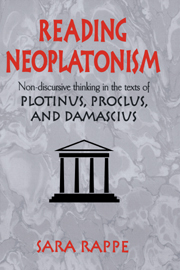Book contents
- Frontmatter
- Contents
- Preface: Discursive Strategies and Neoplatonic Texts
- Acknowledgments
- List of Abbreviations
- 1 Introduction. Representing a Tradition: Exegesis, Symbol, and Self-reflection
- PART I LANGUAGE IN THE ENNEADS
- 2 Plotinus' Critique of Discursive Thinking
- 3 Non-discursive Thinking in the Enneads
- 4 Introspection in the Dialectic of the Enneads
- 5 The Symbolism of the Enneads
- PART TWO TEXT AND TRADITION IN NEOPLATONISM
- References
- General Index
- Index Locorum
3 - Non-discursive Thinking in the Enneads
Published online by Cambridge University Press: 24 October 2009
- Frontmatter
- Contents
- Preface: Discursive Strategies and Neoplatonic Texts
- Acknowledgments
- List of Abbreviations
- 1 Introduction. Representing a Tradition: Exegesis, Symbol, and Self-reflection
- PART I LANGUAGE IN THE ENNEADS
- 2 Plotinus' Critique of Discursive Thinking
- 3 Non-discursive Thinking in the Enneads
- 4 Introspection in the Dialectic of the Enneads
- 5 The Symbolism of the Enneads
- PART TWO TEXT AND TRADITION IN NEOPLATONISM
- References
- General Index
- Index Locorum
Summary
In the last chapter, we looked at Plotinus' visionary approach to Plato's Demiurge and wondered if the unitary world of the soul threatened to elide and engulf the ordinary world of objective essences. The question before us is now, how does Plotinus' conception of the soul overcome, so to speak, the temptations of this unlimited enrichment and avoid falling into a solipsistic dream. In what follows, I will explore the limitations of the soul's world and the soul's vision, showing in particular that Plotinus' views on discursive thinking point to a form of knowledge that asks the individual soul to step outside of its own constructions and its own contents. As we will see in the following chapters, because non-discursive thinking ultimately circumvents the intentional structures of thought, the intentional stance cannot be reified in such a way as to substitute for an objective world order.
Plotinus' views on method and truth involve a rejection of essentialism and a generally cautionary attitude toward discursive thinking. Some features of his anti-essentialism might lead us to think that he does hold to a kind of subjectivism, but in what follows I would like to suggest that this is not accurate. To clarify the problems with characterizing Plotinus as a subjectivist, I turn to a modern critique of subjectivism. In his book, Subjectivity, Realism, and Postmodernism, Frank Farrell points out the hidden ironies of what amounts to a self-deception implicit within Cartesian epistemology.
- Type
- Chapter
- Information
- Reading NeoplatonismNon-discursive Thinking in the Texts of Plotinus, Proclus, and Damascius, pp. 45 - 66Publisher: Cambridge University PressPrint publication year: 2000



